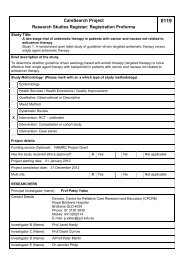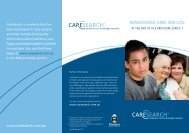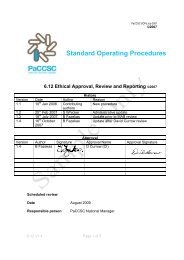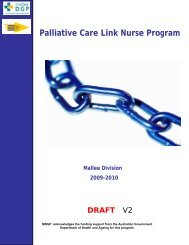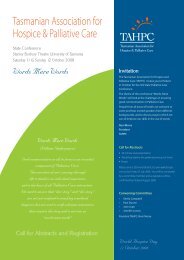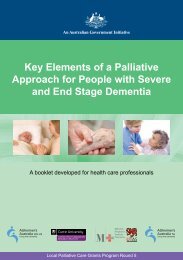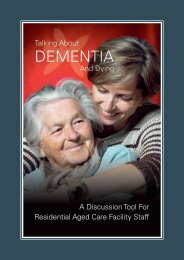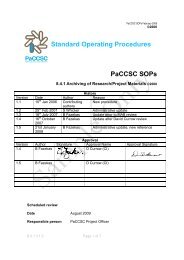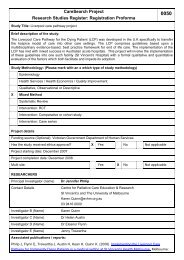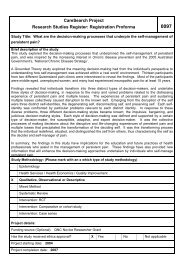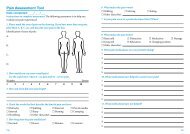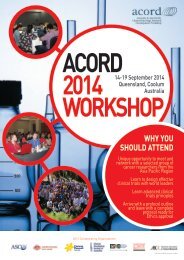Needs Assessment Tool Patients & Families [NAT-P&F] - CareSearch
Needs Assessment Tool Patients & Families [NAT-P&F] - CareSearch
Needs Assessment Tool Patients & Families [NAT-P&F] - CareSearch
You also want an ePaper? Increase the reach of your titles
YUMPU automatically turns print PDFs into web optimized ePapers that Google loves.
<strong>Needs</strong> <strong>Assessment</strong> <strong>Tool</strong><br />
<strong>Patients</strong> & <strong>Families</strong> [<strong>NAT</strong>-P&F]<br />
The topics below are often a concern for people with cancer and those close to them.<br />
Please indicate how concerned you are now about each issue, by placing a tick in the appropriate<br />
column (Level of Concern).<br />
Indicate with a second tick whether you need to discuss the issue with your doctor or other health<br />
professional (eg. cancer care coordinator) or whether you would like to address this concern<br />
yourself (Actions).<br />
The last column indicates where in Life, Hope and Reality you may find resources to help you<br />
address the specific issue.<br />
Take the completed <strong>Needs</strong> <strong>Assessment</strong> <strong>Tool</strong> (<strong>NAT</strong>-P & F) with you to your next doctor’s<br />
appointment. You can use it as a prompt to raise and discuss your concerns.<br />
Section 2:<br />
For Caregivers, family members or<br />
friends<br />
How concerned are you NOW about:<br />
Finding general information about cancer<br />
Patient’s Physical Symptoms:<br />
Knowing the physical symptoms that the person<br />
with cancer may experience<br />
Knowing the extent to which I can help the person<br />
with cancer with managing physical symptoms<br />
Knowing the extent to which I can help the person<br />
with cancer in performing daily living activities<br />
Providing physical care to the person with cancer<br />
requires<br />
The difficulty the person with cancer is having<br />
looking after him/herself<br />
Determining availability of other treatments<br />
My time spent travelling to hospitals and waiting<br />
around for appointments<br />
Getting more information about the physical needs<br />
of the person with cancer and where to go to<br />
obtain the care needed<br />
Patient’s Emotional <strong>Needs</strong>:<br />
Identifying and managing the feelings and<br />
emotional issues the person with cancer may be<br />
experiencing (eg. anxiety, depression)<br />
Identifying and managing the feelings and<br />
emotional issues I am experiencing (eg. anxiety,<br />
depression)<br />
Maintaining or instilling hope in the person with<br />
cancer and myself<br />
Date Completed<br />
Level of concern<br />
None<br />
/<br />
Minor<br />
Some<br />
A lot<br />
Discuss<br />
with<br />
doctor<br />
Actions<br />
Address<br />
concern<br />
myself<br />
Read more<br />
in Life,<br />
Hope &<br />
Reality<br />
Introduction<br />
Physical<br />
<strong>Needs</strong><br />
Emotional<br />
<strong>Needs</strong>
Dealing with changes in the person with cancer’s<br />
sexual feelings<br />
Dealing with changes in my intimate relationship<br />
with the person with cancer<br />
Maintaining the person with cancer’s sense of<br />
worthiness<br />
Managing impaired thinking and changes in<br />
awareness the person with cancer may be<br />
experiencing<br />
Accessing health professionals that can help the<br />
person with cancer and me with emotional needs<br />
Social <strong>Needs</strong>:<br />
Emotional<br />
<strong>Needs</strong><br />
My current social support network<br />
My relationship with the person with cancer<br />
Communicating well with the person with cancer<br />
Communicating well with health professionals<br />
Social <strong>Needs</strong><br />
Conflicting beliefs between my current health care<br />
and my way of life or customs<br />
Overcoming language barriers<br />
My spirituality and finding meaning in my life<br />
Lifestyle<br />
Helping the person with cancer maintain a healthy<br />
lifestyle<br />
Obtaining resources so I can maintain a healthy<br />
life myself<br />
Maintaining the person with cancer’s work<br />
Lifestyle<br />
Obtaining resources so I can continue to work<br />
Finances<br />
My financial situation or legal issues that are<br />
upsetting me or that require assistance<br />
Finances<br />
End of Life<br />
Helping the person with cancer to develop an<br />
advance care directive or “living will”<br />
My feelings about death and dying<br />
End of Life<br />
Making plans for the future or making other<br />
decisions<br />
Implications of caring for a person diagnosed with cancer<br />
Providing the help and support that the person<br />
with cancer requires<br />
Accessing information relevant to my own needs<br />
as a caregiver from relevant support services<br />
The people<br />
who care<br />
Taking the break I need
My illnesses or injuries that make it difficult for me<br />
to care for the person with cancer<br />
Feeling burnt out by my care giving role<br />
The people<br />
who care<br />
Support for my family or friends caring for me<br />
Palliative care<br />
Knowing when palliative care is appropriate for me<br />
to care for the person with cancer<br />
Knowing which cancer specialist the person with<br />
cancer should see to obtain palliative care<br />
Other topics of concern? Please list here and discuss with health professionals:<br />
Palliative<br />
Care<br />
a)<br />
b)<br />
c)


![Needs Assessment Tool Patients & Families [NAT-P&F] - CareSearch](https://img.yumpu.com/37938481/1/500x640/needs-assessment-tool-patients-amp-families-nat-pampf-caresearch.jpg)
